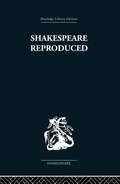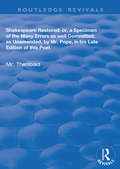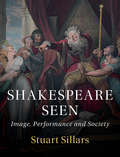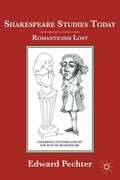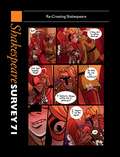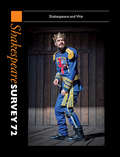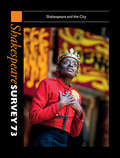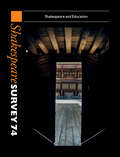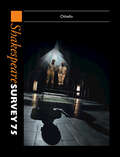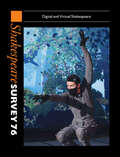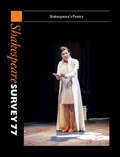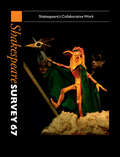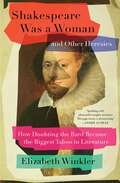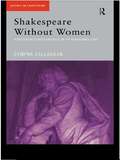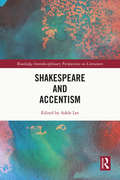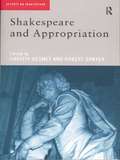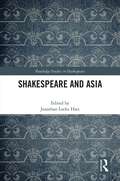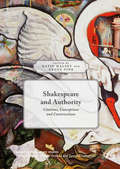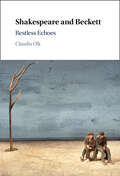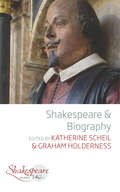- Table View
- List View
Shakespeare Reproduced: The text in history and ideology
by Jean E Howard Marion F O’ConnorFirst published in 1987. The essays in Shakespeare Reproduced offer a political critique of Shakespeare's writings and the uses to which those writings are put Some of the essays focus on Shakespeare in his own time and consider how his plays can be seen to reproduce or subvert the cultural orthodoxies and the power relations of the late Renaissance. Others examine the forces which have produced an overtly political criticism of Shakespeare and of his use in culture. Contributors include: Jean E Howard and Marion O'Connor, Walter Cohen, Don E Wayne, Thomas Cartelli, Peter Erickson, Karen Newman, Thomas Moisan, Michael D Bristol, Thomas Sorge, Jonathan Goldberg, Robert Weimann, Margaret Ferguson.
Shakespeare Restored: Or a Specimen of the many errors as well committed, as unamended by Mr Pope in his late edition of this poet, Etc (Routledge Revivals)
by Lewis TheobaldPublished in 1971, this book is a restored copy of the many works of Shakespeare. This is a work originally from 1725, written in Old English, gives a commentary on the errors in the works of William Shakespeare by Pope. The play merited this treatment is Hamlet, with cross-referencing to his other plays.
Shakespeare Seen: Image, Performance and Society
by Stuart SillarsThis wide-ranging study traces the forces that drove the production and interpretation of visual images of Shakespeare's plays. Covering a rich chronological terrain, from the beginning of the eighteenth century to the midpoint of the nineteenth, Stuart Sillars offers a multidisciplinary, nuanced approach to reading Shakespeare in relation to image, history, text, book history, print culture and performance. The volume begins by relating the production imagery of Shakespeare's plays to other visual forms and their social frames, before discussing the design and operation of illustrated editions and the 'performance readings' they offer, and analysing the practical and theoretical foundations of easel paintings. Close readings of The Comedy of Errors, King Lear, the Roman plays, The Merchant of Venice and Othello provide detailed insight into how the plays have been represented visually, and are accompanied by numerous illustrations and a beautiful colour plate section.
Shakespeare Studies Today
by Edward PechterThe Romantics invented Shakespeare studies, and in losing contact with our origins, we have not been able to develop an adequate alternative foundation on which to build our work. This book asserts that among Shakespeareans at present, the level of conviction required to sustain a healthy critical practice is problematically if not dangerously low, and the qualities which the Romantics valued in an engagement with Shakespeare are either ignored these days or fundamentally misunderstood.
Shakespeare Survey 71: Re-Creating Shakespeare (Shakespeare Survey #71)
by Peter HollandThe 71st in the annual series of volumes devoted to Shakespeare study and production. The articles, like those of volume 70, are drawn from the World Shakespeare Congress, held 400 years after Shakespeare's death, in July/August 2016 in Stratford-upon-Avon and London. The theme is 'Re-Creating Shakespeare'.
Shakespeare Survey 72: Volume 72, Shakespeare and War (Shakespeare Survey #72)
by Emma SmithThe 72nd in the annual series of volumes devoted to Shakespeare study and production. The articles are drawn from the programme of the International Shakespeare Conference held in Stratford-upon-Avon in the summer of 2018. The theme is 'Shakespeare and War'.
Shakespeare Survey 73: Shakespeare and the City (Shakespeare Survey #73)
by Emma SmithShakespeare Survey is a yearbook of Shakespeare studies and production. Since 1948, Survey has published the best international scholarship in English and many of its essays have become classics of Shakespeare criticism. Each volume is devoted to a theme, or play, or group of plays; each also contains a section of reviews of that year's textual and critical studies and of the year's major British performances. The theme for Volume 73 is 'Shakespeare and the City'. The complete set of Survey volumes is also available online at https://www.cambridge.org/core/what-we-publish/collections/shakespeare-survey This fully searchable resource enables users to browse by author, essay and volume, search by play, theme and topic and save and bookmark their results.
Shakespeare Survey 74: Shakespeare and Education (Shakespeare Survey)
by Emma SmithShakespeare Survey is a yearbook of Shakespeare studies and production. Since 1948, Survey has published the best international scholarship in English and many of its essays have become classics of Shakespeare criticism. Each volume is devoted to a theme, or play, or group of plays; each also contains a section of reviews of that year's textual and critical studies and of the year's major British performances. The theme for Volume 74 is 'Shakespeare and Education. The complete set of Survey volumes is also available online at https://www.cambridge.org/core/what-we-publish/collections/shakespeare-survey This fully searchable resource enables users to browse by author, essay and volume, search by play, theme and topic and save and bookmark their results.
Shakespeare Survey 75: Othello (Shakespeare Survey #Series Number 73)
by Emma SmithShakespeare Survey is a yearbook of Shakespeare studies and production. Since 1948, Survey has published the best international scholarship in English and many of its essays have become classics of Shakespeare criticism. Each volume is devoted to a theme, or play, or group of plays; each also contains a section of reviews of that year's textual and critical studies and of the year's major British performances. The theme for Volume 75 is 'Othello'. The complete set of Survey volumes is also available online at https://www.cambridge.org/core/what-we-publish/collections/shakespeare-survey This fully searchable resource enables users to browse by author, essay and volume, search by play, theme and topic and save and bookmark their results.
Shakespeare Survey 76: Digital and Virtual Shakespeare (Shakespeare Survey #76)
by Emma SmithShakespeare Survey is a yearbook of Shakespeare studies and production. Since 1948, Survey has published the best international scholarship in English and many of its essays have become classics of Shakespeare criticism. Each volume is devoted to a theme, or play, or group of plays; each also contains a section of reviews of that year's textual and critical studies and of the year's major British performances. The theme for Volume 76 is 'Digital and Virtual Shakespeare'. The complete set of Survey volumes is also available online at https://www.cambridge.org/core/publications/collections/cambridge-shakespeare. This searchable resource enables users to browse by author, essay and volume, search by play, theme and topic and save and bookmark their results.
Shakespeare Survey 77: Shakespeare's Poetry (Shakespeare Survey)
by Emma Smith Hannah Crawforth Elizabeth Scott-BaumannShakespeare Survey is a yearbook of Shakespeare studies and production. Since 1948, Survey has published the best international scholarship in English and many of its essays have become classics of Shakespeare criticism. Each volume is devoted to a theme, or play, or group of plays; each also contains a section of reviews of that year's textual and critical studies and of the year's major British performances. The theme for Volume 77 is 'Shakespeare's Poetry'. The complete set of Survey volumes is also available online at www.cambridge.org/core/publications/collections/cambridge-shakespeare. This searchable resource enables users to browse by author, essay and volume, search by play, theme and topic, and save and bookmark their results.
Shakespeare Survey: Shakespeare Survey
by Peter Holland Emma Peter Smith Emma Smith HollandShakespeare Survey is a yearbook of Shakespeare studies and production. Since 1948 Survey has published the best international scholarship in English and many of its essays have become classics of Shakespeare criticism. Each volume is devoted to a theme, or play, or group of plays; each also contains a section of reviews of the previous year's textual and critical studies and of major British performances. The books are illustrated with a variety of Shakespearean images and production photographs. The current editor of Survey is Peter Holland. The first eighteen volumes were edited by Allardyce Nicoll, numbers 19-33 by Kenneth Muir and numbers 34-52 by Stanley Wells. The virtues of accessible scholarship and a keen interest in performance, from Shakespeare's time to our own, have characterised the journal from the start. For the first time, numbers 1-50 are being reissued in paperback, available separately and as a set.
Shakespeare Survey: Volume 62, Close Encounters with Shakespeare's Text
by Peter HollandShakespeare Survey is a yearbook of Shakespeare studies and production. Since 1948 Survey has published the best international scholarship in English and many of its essays have become classics of Shakespeare criticism. Each volume is devoted to a theme, or play, or group of plays; each also contains a section of reviews of the previous year's textual and critical studies and of major British performances. The books are illustrated with a variety of Shakespearean images and production photographs. The current editor of Survey is Peter Holland. The first eighteen volumes were edited by Allardyce Nicoll, numbers 19-33 by Kenneth Muir and numbers 34-52 by Stanley Wells. The virtues of accessible scholarship and a keen interest in performance, from Shakespeare's time to our own, have characterized the journal from the start. For the first time, numbers 1-50 are being reissued in paperback, available separately and as a set.<P> The theme for volume 62 is 'Close Encounters with Shakespeare's Text'. The complete set of Survey volumes is also available online at http://www.cambridge.org/online/shakespearesurvey. This fully-searchable resource enables users to browse by author, essay and volume, search by play, theme and topic, and save and bookmark their results.
Shakespeare Survey: Volume 64, Shakespeare as Cultural Catalyst
by Peter HollandShakespeare Survey is a yearbook of Shakespeare studies and production. Since 1948 Survey has published the best international scholarship in English and many of its essays have become classics of Shakespeare criticism. Each volume is devoted to a theme, or play, or group of plays; each also contains a section of reviews of the previous year's textual and critical studies and of major British performances. The books are illustrated with a variety of Shakespearean images and production photographs. The current editor of Survey is Peter Holland. The first eighteen volumes were edited by Allardyce Nicoll, numbers 19-33 by Kenneth Muir and numbers 34-52 by Stanley Wells. The virtues of accessible scholarship and a keen interest in performance, from Shakespeare's time to our own, have characterized the journal from the start. For the first time, numbers 1-50 are being reissued in paperback, available separately and as a set.<P> The theme for volume 64 is 'Shakespeare as Cultural Catalyst'. The complete set of Survey volumes is also available online at http://www.cambridge.org/online/shakespearesurvey. This fully-searchable resource enables users to browse by author, essay and volume, search by play, theme and topic, and save and bookmark their results.
Shakespeare Survey: Volume 65, A Midsummer Night's Dream
by Peter HollandShakespeare Survey is a yearbook of Shakespeare studies and production. Since 1948 Survey has published the best international scholarship in English and many of its essays have become classics of Shakespeare criticism. Each volume is devoted to a theme, or play, or group of plays; each also contains a section of reviews of the previous year's textual and critical studies and of major British performances. The books are illustrated with a variety of Shakespearean images and production photographs. The current editor of Survey is Peter Holland. The first eighteen volumes were edited by Allardyce Nicoll, numbers 19-33 by Kenneth Muir and numbers 34-52 by Stanley Wells. The virtues of accessible scholarship and a keen interest in performance, from Shakespeare's time to our own, have characterized the journal from the start. For the first time, numbers 1-50 are being reissued in paperback, available separately and as a set.<P> The theme for Volume 65 is 'A Midsummer Night's Dream'. The complete set of Survey volumes is also available online at http://www.cambridge.org/online/shakespearesurvey. This fully searchable resource enables users to browse by author, essay and volume, search by play, theme and topic and save and bookmark their results.
Shakespeare Survey: Volume 66, Working with Shakespeare
by Peter HollandShakespeare Survey is a yearbook of Shakespeare studies and production. Since 1948 Survey has published the best international scholarship in English and many of its essays have become classics of Shakespeare criticism. Each volume is devoted to a theme, or play, or group of plays; each also contains a section of reviews of the previous year's textual and critical studies and of major British performances. The books are illustrated with a variety of Shakespearean images and production photographs. The current editor of Survey is Peter Holland. The first eighteen volumes were edited by Allardyce Nicoll, numbers 19-33 by Kenneth Muir and numbers 34-52 by Stanley Wells. The virtues of accessible scholarship and a keen interest in performance, from Shakespeare's time to our own, have characterized the journal from the start. For the first time, numbers 1-50 are being reissued in paperback, available separately and as a set. <P> The theme for Volume 66 is 'Working with Shakespeare', and Tiffany Stern's essay has been selected by the Medieval and Renaissance Drama Society for its Barbara Palmer/Martin Stevens award for best new essay in early drama studies, 2014. The complete set of Survey volumes is also available online at http://www.cambridge.org/online/shakespearesurvey. This fully searchable resource enables users to browse by author, essay and volume, search by play, theme and topic and save and bookmark their results.
Shakespeare Survey: Volume 67, Shakespeare's Collaborative Work
by Peter Holland Ton HoenselaarsShakespeare Survey is a yearbook of Shakespeare studies and production. Since 1948 Survey has published the best international scholarship in English and many of its essays have become classics of Shakespeare criticism. Each volume is devoted to a theme, or play, or group of plays; each also contains a section of reviews of the previous year's textual and critical studies and of major British performances. The books are illustrated with a variety of Shakespearean images and production photographs. The current editor of Survey is Peter Holland. The first eighteen volumes were edited by Allardyce Nicoll, numbers 19-33 by Kenneth Muir and numbers 34-52 by Stanley Wells. The virtues of accessible scholarship and a keen interest in performance, from Shakespeare's time to our own, have characterized the journal from the start. For the first time, numbers 1-50 are being reissued in paperback, available separately and as a set.<P> The theme for Volume 67 is 'Shakespeare's Collaborative Work'. The complete set of Survey volumes is also available online at http://www.cambridge.org/online/shakespearesurvey. This fully searchable resource enables users to browse by author, essay and volume, search by play, theme and topic, and save and bookmark their results.
Shakespeare Was a Woman and Other Heresies: How Doubting the Bard Became the Biggest Taboo in Literature
by Elizabeth WinklerAn &“extraordinarily brilliant&” and &“pleasurably naughty&” (André Aciman) investigation into the Shakespeare authorship question, exploring how doubting that William Shakespeare wrote his plays became an act of blasphemy…and who the Bard might really be.The theory that Shakespeare may not have written the works that bear his name is the most horrible, unspeakable subject in the history of English literature. Scholars admit that the Bard&’s biography is a &“black hole,&” yet to publicly question the identity of the god of English literature is unacceptable, even (some say) &“immoral.&” In Shakespeare Was a Woman and Other Heresies, journalist and literary critic Elizabeth Winkler sets out to probe the origins of this literary taboo. Whisking you from London to Stratford-Upon-Avon to Washington, DC, she pulls back the curtain to show how the forces of nationalism and empire, religion and mythmaking, gender and class have shaped our admiration for Shakespeare across the centuries. As she considers the writers and thinkers—from Walt Whitman to Sigmund Freud to Supreme Court justices—who have grappled with the riddle of the plays&’ origins, she explores who may perhaps have been hiding behind his name. A forgotten woman? A disgraced aristocrat? A government spy? Hovering over the mystery are Shakespeare&’s plays themselves, with their love for mistaken identities, disguises, and things never quite being what they seem. As she interviews scholars and skeptics, Winkler&’s interest turns to the larger problem of historical truth—and of how human imperfections (bias, blindness, subjectivity) shape our construction of the past. History is a story, and the story we find may depend on the story we&’re looking for. &“Lively&” (The Washington Post), &“fascinating&” (Amanda Foreman), and &“intrepid&” (Stacy Schiff), Shakespeare Was a Woman and Other Heresies will forever change how you think of Shakespeare…and of how we as a society decide what&’s up for debate and what&’s just nonsense, just heresy.
Shakespeare Without Women (Accents on Shakespeare)
by Dympna CallaghanFirst published in 1999. Routledge is an imprint of Taylor & Francis, an informa company.
Shakespeare and Accentism (Routledge Interdisciplinary Perspectives on Literature)
by Adele LeeThis collection explores the consequences of accentism—an under-researched issue that intersects with racism and classism—in the Shakespeare industry across languages and cultures, past and present. It adopts a transmedia and transhistorical approach to a subject that has been dominated by the study of "Original Pronunciation." Yet the OP project avoids linguistically "foreign" characters such as Othello because of the additional complications their "aberrant" speech poses to the reconstruction process. It also evades discussion of contemporary, global practices and, underpinning the enterprise, is the search for an aural "purity" that arguably never existed. By contrast, this collection attends to foreign speech patterns in both the early modern and post-modern periods, including Indian, East Asian, and South African, and explores how accents operate as "metasigns" reinforcing ethno-racial stereotypes and social hierarchies. It embraces new methodologies, which includes reorienting attention away from the visual and onto the aural dimensions of performance.
Shakespeare and Appropriation: George Eliot, A. C. Swinburne, Robert Browning, And Charles Dickens (Accents on Shakespeare)
by Christy Desmet Robert SawyerThe vitality of our culture is still often measured by the status Shakespeare has within it. Contemporary readers and writers continue to exploit Shakespeare's cultural afterlife in a vivid and creative way. This fascinating collection of original essays shows how writers' efforts to imitate, contradict, compete with, and reproduce Shakespeare keep him in the cultural conversation. The essays: * analyze the methods and motives of Shakespearean appropriation * investigate theoretically the return of the repressed author in discussions of Shakespeare's cultural function * put into dialogue theoretical and literary responses to Shakespeare's cultural authority * analyze works ranging from nineteenth century to the present, and genres ranging from poetry and the novel to Disney movies.
Shakespeare and Asia (Routledge Studies in Shakespeare)
by Jonathan Locke HartShakespeare and Asia brings together innovative scholars from Asia or with Asian connections to explore these matters of East-West and global contexts then and now. The collection ranges from interpretations of Shakespeare’s plays and his relations with other authors like Marlowe and Dickens through Shakespeare and history and ecology to studies of film, opera or scholarship in Japan, Russia, India, Pakistan, Singapore, Taiwan and mainland China. The adaptations of Kozintsev and Kurosawa; Bollywood adaptations of Shakespeare’s plays; different Shakespearean dramas and how they are interpreted, adapted and represented for the local Pakistani audience; the Peking-opera adaptation of Hamlet ; Féng Xiǎogāng’s The Banquet as an adaptation of Hamlet; the ideology of the film, Shakespeare Wallah. Asian adaptations of Hamlet will be at the heart of this volume. Hamlet is also analyzed in light of Oedipus and the Sphinx. Shakespeare is also considered as a historicist and in terms of what influence he has on Chinese writers and historical television. Lear is Here and Cleopatra and Her Fools, two adapted Shakespearean plays on the contemporary Taiwanese stage, are also discussed. This collection also examines in Shakespeare the patriarchal prerogative and notion of violence; carnival and space in the comedies; the exotic and strange; and ecology. The book is rich, ranging and innovative and will contribute to Shakespeare studies, Shakespeare and media and film, Shakespeare and Asia and global Shakespeare.
Shakespeare and Authority
by Katie Halsey Angus VineThis book examines conceptions of authority for and in Shakespeare, and the construction of Shakespeare as literary and cultural authority. The first section, Defining and Redefining Authority, begins by re-defining the concept of Shakespeare's sources, suggesting that 'authorities' and 'resources' are more appropriate terms. Building on this conceptual framework, the remainder of this section explores linguistic and discursive authority more broadly. The second section, Shakespearean Authority, considers the construction, performance and questioning of authority in Shakespeare's plays. Essays here range from examinations of monarchical authority to discussions of household authority, literary authority and linguistic ownership. The final part, Shakespeare as Authority, then traces the increasing establishment of Shakespeare as an authority from the eighteenth to the twenty-first century in a series of essays that explore Shakespearean authority for editors, actors, critics, authors, readers and audiences. The volume concludes with two essays that reassess Shakespeare as an authority for visual culture - in the cinema and in contemporary art.
Shakespeare and Beckett
by Claudia Olk'The danger is in the neatness of identifications', Samuel Beckett famously stated, and, at first glance, no two authors could be further distant from one another than William Shakespeare and Samuel Beckett. This book addresses the vast intertextual network between the works of both writers and explores the resonant correspondences between them. It analyses where and how these resonances manifest themselves in their aesthetics, theatre, language and form. It traces convergences and inversions across both œuvres that resound beyond their conditions of production and possibility. Uncovering hitherto unexplored relations between the texts of an early modern and a late modern author, this study seeks to offer fresh readings of single passages and entire works, but it will also describe productive tensions and creative incongruences between them.
Shakespeare and Biography (Shakespeare & #8)
by Graham Holderness Katherine ScheilFrom Shakespeare’s religion to his wife to his competitors in the world of early modern theatre, biographers have approached the question of the Bard’s life from numerous angles. Shakespeare & Biography offers a fresh look at the biographical questions connected with the famous playwright’s life, through essays and reflections written by prominent international scholars and biographers.
